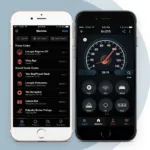A GPS OBD2 tracker is a device that plugs into your vehicle’s OBD2 port and uses GPS technology to track its location. This data can be accessed in real-time on your smartphone or computer, providing you with valuable insights into your vehicle’s whereabouts and performance.
Understanding GPS OBD2 Trackers
GPS OBD2 trackers utilize the onboard diagnostics system (OBD2), a standard feature in most vehicles manufactured after 1996. The OBD2 port, usually located under the dashboard, grants access to a wealth of vehicle data, including location, speed, fuel efficiency, engine performance, and diagnostic trouble codes (DTCs).
These trackers work by communicating with the vehicle’s GPS receiver and transmitting location data to a server via cellular networks. You can then access this data through a dedicated app or website.
Benefits of Using GPS OBD2 Trackers
Integrating a GPS OBD2 tracker into your vehicle offers numerous benefits:
- Real-Time Vehicle Tracking: Monitor your vehicle’s location anytime, anywhere, ensuring peace of mind and enhanced security.
- Vehicle Security: In case of theft, these trackers facilitate quick recovery by providing real-time location updates to you and law enforcement.
- Improved Fleet Management: Businesses can optimize fleet operations, track vehicle usage, and improve driver accountability with GPS OBD2 trackers.
- Enhanced Safety Features: Some trackers offer features like geofencing, which sends alerts when the vehicle enters or exits pre-defined zones, promoting responsible driving habits.
- Vehicle Diagnostics: Access to DTCs allows for proactive vehicle maintenance, potentially preventing costly repairs.
- Insurance Benefits: Some insurance companies offer discounts for vehicles equipped with GPS tracking devices, recognizing their theft-deterrent and safety benefits.
Choosing the Right GPS OBD2 Tracker
![]() Comparison table of top-rated GPS OBD2 trackers
Comparison table of top-rated GPS OBD2 trackers
Selecting the right GPS OBD2 tracker depends on your specific needs and budget. Consider the following factors:
- Tracking Features: Real-time tracking, trip history, geofencing, and speed alerts are common features to look for.
- Subscription Costs: Most GPS trackers require a monthly or annual subscription for data access and cellular connectivity.
- Device Compatibility: Ensure the tracker is compatible with your vehicle’s make, model, and year.
- Ease of Installation and Use: Opt for a tracker with a straightforward setup process and a user-friendly mobile app or website interface.
- Additional Features: Some trackers offer advanced features such as driver behavior monitoring, fuel consumption analysis, and maintenance reminders.
Installation and Setup
Installing a GPS OBD2 tracker is generally a plug-and-play process:
- Locate Your OBD2 Port: It’s typically located beneath the driver’s side dashboard.
- Plug in the Tracker: Insert the tracker firmly into the OBD2 port.
- Download the App or Visit the Website: Follow the manufacturer’s instructions to create an account and register your device.
- Configure Settings: Customize tracking preferences, alerts, and other features according to your needs.
GPS OBD2 Trackers: A Valuable Investment
“Investing in a GPS OBD2 tracker provides more than just location tracking,” says John Miller, automotive technology expert at Car Tech Solutions. “It offers a comprehensive solution for vehicle security, performance monitoring, and driver safety, ultimately enhancing the overall driving experience.”
GPS OBD2 trackers have revolutionized how we interact with our vehicles. They offer a powerful combination of location tracking, vehicle diagnostics, and safety features, making them a valuable asset for individuals and businesses alike.
By providing real-time insights into your vehicle’s whereabouts and performance, GPS OBD2 trackers grant you peace of mind, enhance security, and empower you to make informed decisions about your vehicle’s maintenance and usage.
FAQs about GPS OBD2 Trackers
1. Do GPS OBD2 trackers drain the vehicle’s battery?
GPS trackers consume minimal power and are designed to have a negligible impact on battery life.
2. Can I use a GPS OBD2 tracker on any vehicle?
Most trackers are compatible with vehicles manufactured after 1996 equipped with an OBD2 port. However, it’s essential to check for compatibility with your specific make and model.
3. Are GPS OBD2 trackers legal?
Yes, using a GPS tracker for personal vehicle tracking or fleet management is generally legal. However, it’s crucial to be aware of and comply with local laws and regulations.
4. What is the range of a GPS OBD2 tracker?
GPS trackers rely on cellular networks for data transmission, so their range is virtually unlimited as long as there is cellular coverage.
5. Can I transfer a GPS OBD2 tracker to another vehicle?
Yes, most trackers can be easily unplugged from one vehicle and plugged into another, provided they are compatible.
Need Help?
Do you have more questions about GPS OBD2 trackers? Our team of experts is here to assist you! Contact us via WhatsApp at +1(641)206-8880 or email us at [email protected]. We offer 24/7 customer support to answer your queries and guide you through choosing the right GPS tracker for your needs.

